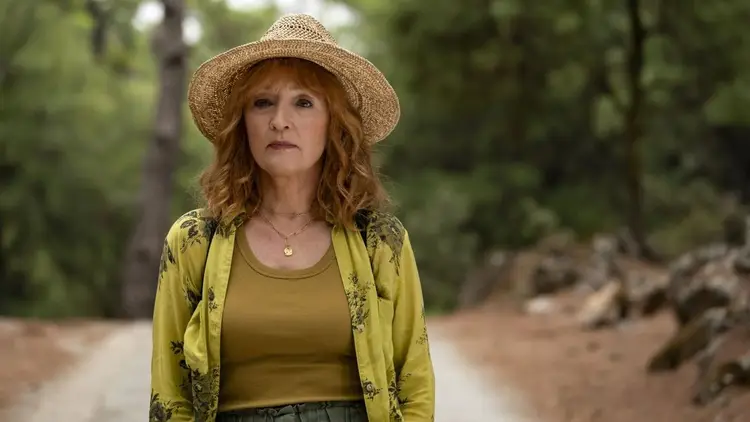Moonflower Murders is cosy crime with a dash of magic

Are you a fan of cozy mysteries? What if we added a sprinkle of magic to the mix? That's the unusual yet unexpectedly delightful combination presented in BBC One's Moonflower Murders, the second adaptation of Anthony Horowitz's work from the Magpie Murders series.

Lesley Manville reprised her role as Susan Ryeland, a book editor and occasional mystery solver, always eager for a clever puzzle to tackle. At the close of the last season, she had left her life in publishing behind and relocated to Crete to manage a guesthouse with her partner, Andreas (Alexandros Logothetis). However, a true amateur detective can never really stay away from a mystery.
When a hotel-owning couple reached out to Susan while in Greece, pleading for her assistance in finding their lost daughter, Cecily (Amy Griffiths), she found it impossible to ignore their plea. After dealing with difficult guests for too long, she candidly informed Andreas that she would accept their request for help.
Additionally, Susan was personally invested in finding out where Cecily was. It appeared that her vanishing was linked to a murder that took place at her family's luxurious hotel, Branlow Hall, and the situation started to get strange.
The murder motivated a book by Susan's celebrated client, crime author Alan Conway (played by Conleth Hill), who met his end in the last season. The novel revolved around a detestable guest (played expertly by Mark Gatiss) who arrived the evening before Cecily's wedding.
Did I mention it was strange? Let's call it surreal instead. Alan's gripping story introduced us to Atticus Pünd, a detective reminiscent of Hercule Poirot. As Susan dove into the book to uncover hidden clues, the narrative shifted back and forth between the present and Pünd’s cases set in the charming Suffolk of the 1950s. Characters from the "real" world reemerged in these fictional roles. It might seem a bit perplexing when written down, but it all came together beautifully when brought to life on screen.

The Suffolk setting resembled a live-action version of Cluedo, revolving around the bitter ex-movie star Melissa (played by Rosalie Craig, who also portrayed Cecily's jealous sister in the present). After leaving Hollywood behind, she reluctantly managed a hotel but mostly wallowed in her bitterness. She despised her wealthy husband and was involved in some shady dealings with her untrustworthy financial adviser (Will Tudor, who also acted as Cecily's fiancé).
Horowitz has mentioned that his novel, Moonflower Murders, drew inspiration from his experience working on the well-known small-town mystery series, Midsomer Murders. You can definitely see traces of that lighthearted and quirky mystery style in this story, particularly in the scenes set in 1950s Suffolk, which are as enjoyable as cucumber sandwiches and orange squash.
What makes this series unique among cozy mystery shows is that Alan’s fictional detective interacts with the real world. While Susan was deeply engrossed in reading Atticus Pünd Takes the Case, she was visited by Pünd himself, who jokingly teased her about her efforts to uncover the truth within the story. Timothy McMullan portrayed the esteemed detective with a subtle charm, avoiding any exaggerated performance.
The Susan-Atticus scenes were definitely the most unusual part of an already bizarre show. At one moment, Susan was sitting at a table in Crete, seemingly having a conversation with herself, when the camera shifted to reveal Pünd suddenly sitting next to her. If I were Cecily's anxious parents, I wouldn't feel comfortable relying on someone who talks to imaginary detectives. Thankfully, Manville's charm made these interactions seem credible.
Television is filled with complex thrillers, from the BBC's faithful adaptations of Agatha Christie stories to the playful Knives Out movies. However, Moonflower Murders offered a fresh twist to a formula that might feel overused. It cleverly combined a contemporary murder investigation with a quirky, vintage mystery, creating a delightful fusion of the old and the new.
The story of 'Moonflower Murders' will carry on next Saturday at 9:25 PM on BBC One.









































